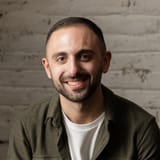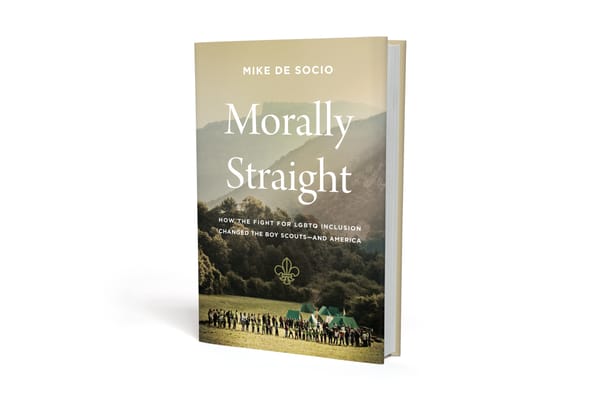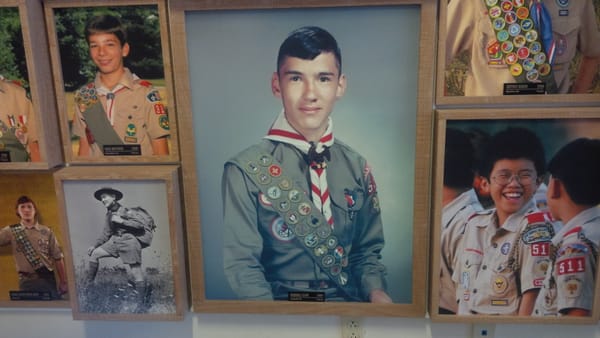To grow Scouting, this BSA territory is doubling down on diversity, equity and inclusion
At a conference held in January, National Service Territory 12 put DEI discussions at the center of membership growth.
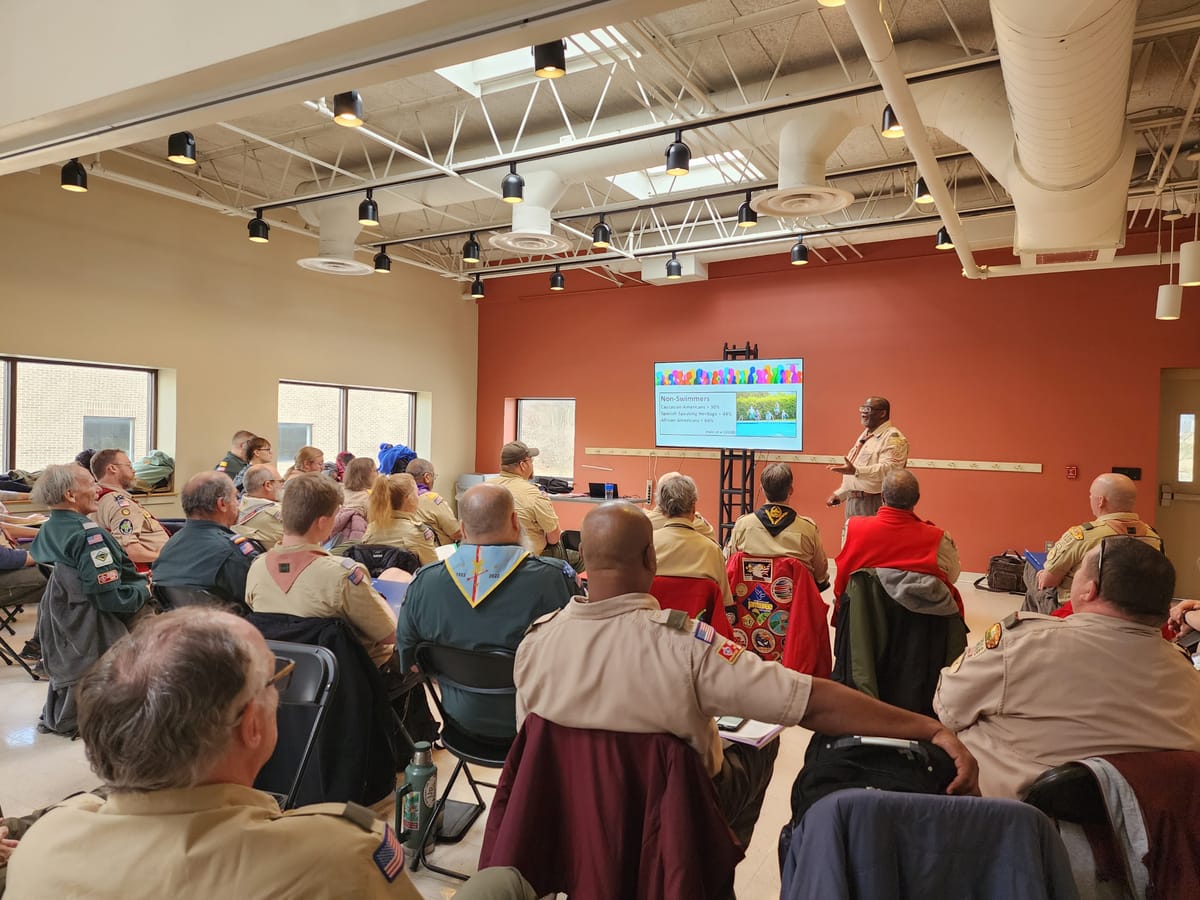
Cathie Seebauer does not believe that diversity, equity and inclusion work should exist in a silo.
In fact, she sees that work as the key to growing membership in Scouting, and keeping kids in the program. In her role leading DEI efforts for National Service Territory 12—an area centered around Washington D.C. and including parts of Maryland, Virginia and Pennsylvania—she recently organized an event to put that philosophy into action.
The “Growing Scouting Conference” was held at the end of January, and engaged a broad array of council- and troop-level scouters in discussions about how to make the program a more welcoming place for all young people.
I spoke with Seebauer to learn more about how it went, and the lessons she’ll be taking with her. Our conversation is below, lightly edited for clarity and brevity.
Mike De Socio: Before we get into the event itself, can you tell me a bit more about yourself and your Scouting background?
Cathie Seebauer: Sure. I first joined the program through Venturing. My brother was in Boy Scouts, and so I always tagged along on his adventures, but wasn't allowed to join myself until I was old enough for the Venturing program. At the time, girls weren't allowed in Scouts BSA, so Venturing was your only option. And then I worked my way up through the Venturing program, and then in 2017, I was the national Venturing vice president. Most of the work I've done has been historically through Venturing and in Jamborees as well. I was the emcee at the 2017 National Jamboree. And I did some work with the World Jamboree that was here. And now all I do is DEI-related stuff, so DEI for the upcoming Jamboree, and as the National Service Territory 12 DEI lead.
De Socio: Tell me more about the NST role. How exactly does that work? What are your responsibilities there?
Seebauer: So it's exciting in the sense that it's an entirely new role. Two years ago, when the regions and areas were combined to form territories, they sort of restructured the whole organization. And DEI was a new role that they decided, this is something that's important, and something that we want to have someone specifically focused on in the future. And so it is cool in the sense that there's no rulebook for it really yet, we're sort of paving our own path right now.
But our primary focus so far has been on getting a DEI lead in each council, is sort of priority number one, is to make sure all of our councils have someone that's focused on that, which has been definitely a large task so far. I'd say about half of our councils might have a DEI lead. And a couple of those have full committees under them. But even just getting one contact person on each council is our biggest goal.
De Socio: So at the end of January you hosted this Growing Scouting Conference. How did that come together?
Seebauer: This came out of us thinking that DEI is a priority for the BSA, in the sense that Scouting can only grow if it's a welcoming community for all. If you look at the BSA's vision statement, it says it wants to prepare all young people by the Scout Oath and Law to be successful leaders. And we really want to emphasize “all young people,” which means all scouts, all youth should feel welcome in our program, regardless of their background, regardless of their ethnicity, regardless of their gender, regardless of their sexual orientation—all of those things should be feel welcome and safe within the BSA.
So it was our line of thinking that, DEI has always been segmented off to the side, and it's something that we really need to integrate into our line of thinking when we're thinking about membership growth and we're thinking about the success of the entire organization in the future. Our goal was to bring this out into the light and say, “Hey, this is something that's important, and it's something that we want to focus on.” It's not just a little side show that's a couple of volunteers. This is something that our key three should be focusing on. This is something that our membership lead should be focusing on. It's something that everyone within the BSA has a role to play in. It's not just the DEI volunteers that have a role to play.
De Socio: So you see DEI work as a central piece of growing membership, then?
Seebauer: Yeah, that's how we phrase it. We say, diversity is about just recruiting folks of different backgrounds into the program. But in order to retain them in the program, we need to have equity and inclusion. We need to make these folks feel like they're welcome, feel like they have a place. Otherwise they'll leave the program. So that's our focus on inclusion and equity efforts, is keeping people. Can they afford financially to stay in the program, equity wise? Can they feel included at the summer camp facilities?
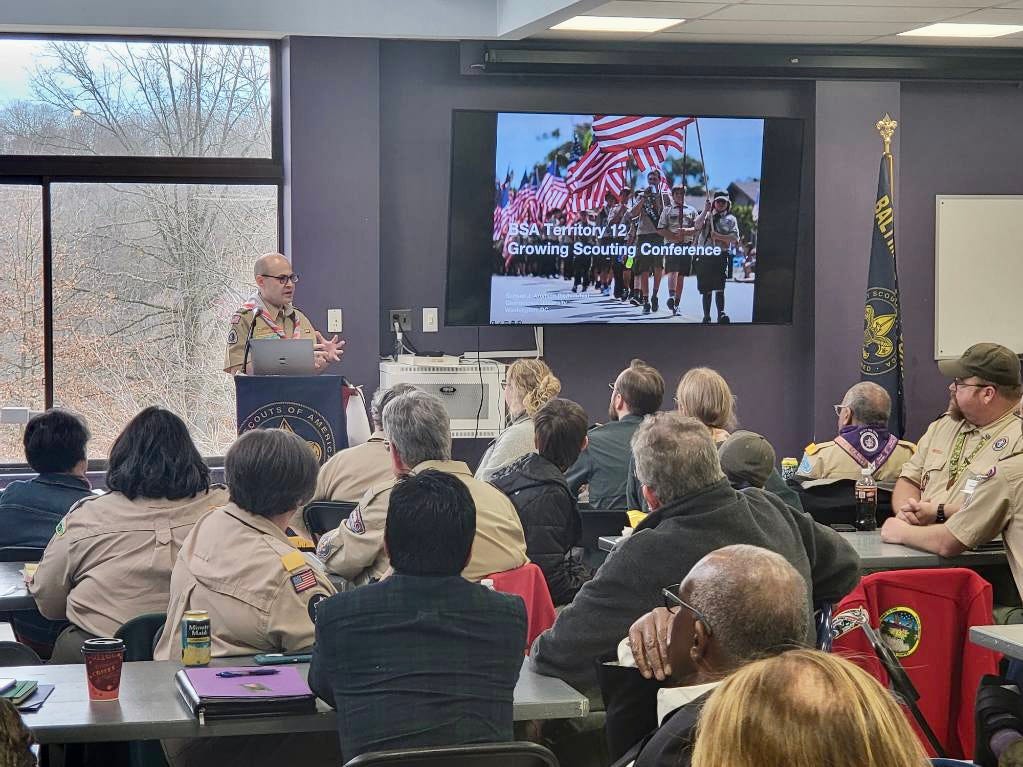
De Socio: That makes a lot of sense. So the event was primarily aimed at adult volunteers, is that right?
Seebauer: Yeah, we ended up having 80 people from 16 different councils in three different territories. And rough numbers, I'd say about three quarters of them were folks that are in district or council leadership positions, so commissioners, professionals, membership committees, and folks that just wanted to expand their DEI knowledge, because it's not something that they had worked with on a day-to-day basis in the past. And then I'd say the remaining one quarter of them were unit-level volunteers who are just really passionate about DEI. There were sort of two different perspectives in the room, ones that are primarily there for sort of the membership side of things, but wanting to learn about the DEI, and folks who have been passionate about DEI and haven't really had an avenue to express that and share that before.
De Socio: What were your goals going into the event? What were you hoping that people would walk away with?
Seebauer: I think our goal was, first of all, just to show that this was a priority, like just statement-wise, as opposed to necessarily the outcomes. We had multiple different tracks, so people could sort of choose their own adventure, in the sense of what their interests were. So for example, we had one track that was specifically for council leadership, so professionals, board members, presidents, and we talked about everything within that track was relevant for their roles. So there was a session on increasing board diversity. There was a session on increasing volunteer leadership diversity. There was a session on creating a DEI committee. There's one on engaging younger adults in leadership. So it was sort of tailored specifically for them.
Whereas there was another track that was more focused on the outcomes for, say, a membership personnel. So that might be, we had a session on inclusive language within marketing materials, because our program folks are making marketing materials all the time, things like that. So we had those two [tracks] , then another [track] that we called more specific for DEI volunteers that might go more in depth on specific topics that they deal with on their work as DEI volunteers.
De Socio: And how did the event end up going? Can you share some of the highlights?
Seebauer: I thought it went really well. We had really positive feedback on the feedback forms that we got back afterwards. People were excited to meet other like-minded folks. I mean, I think the LGBTQ+ network already has a Facebook group and stuff per se, but other communities might not have had that obvious network to connect with other folks that might be going through the same things as them. So people said it really gave them a lot of optimism about the future of Scouting, especially because they saw folks that were council presidents, council commissioners, council scout executives that were there. And they were participating and showing that this is their priority going forward. So I think it helped a lot of people feel seen and heard, and that their perspective is valuable within the BSA.
We started the day with just a basic general overview session, so we're all on the same page in terms of language and discussions. Then we moved into things like confronting your own bias, we had a session on that, which was more of a chance for everyone to kick off the day by reflecting a little bit on their personal experiences, just because we anticipated some folks being a little bit defensive when they showed up, so breaking down those barriers to begin with.
And this was something we didn't really have any roadmap on what to do. As far as we know, nothing like this has happened anywhere else in the country. We've heard of trainings or sessions that are specific to women in Scouting, and maybe like specific on one topic, but this is the first time that we know of anyone has done one that's on all of DEI related topics. So we didn't really have any roadmap to go off of. So this was a learning experience, and I think there's things that we might change, if we did it again. But in general, we were really happy with it. And people said that if we held something similar again, they would definitely come back and they would bring others from the council now that they know more of what it's about.
De Socio: Were there any more challenging parts of the day? Any challenging conversations?
Seebauer: We tried to give people opportunities to share their personal stories, which I know is sometimes difficult to hear just emotionally, to hear some of these things that people have gone through in Scouting, and it might not be the organization that people know, per se. So for example, it might be the first time someone like a council commissioner has heard some of the stories that people had to share about their personal experiences in Scouting and how they might have felt unwelcome or unsafe at different times.
We tried to anticipate that to some degree. So besides the sessions that we had going on, we also had two different breakout rooms. So one that was like a nice, comfortable lounge so people could go to the lounge room and relax and have continued conversations outside of sessions. And then we also had a cool-down room, we called it the yoga room, it was a dark room that was quiet, a nice, quiet dark place to get away from the difficult discussions that were being held. So we tried to give people an out if they needed a break from everything that was going on.
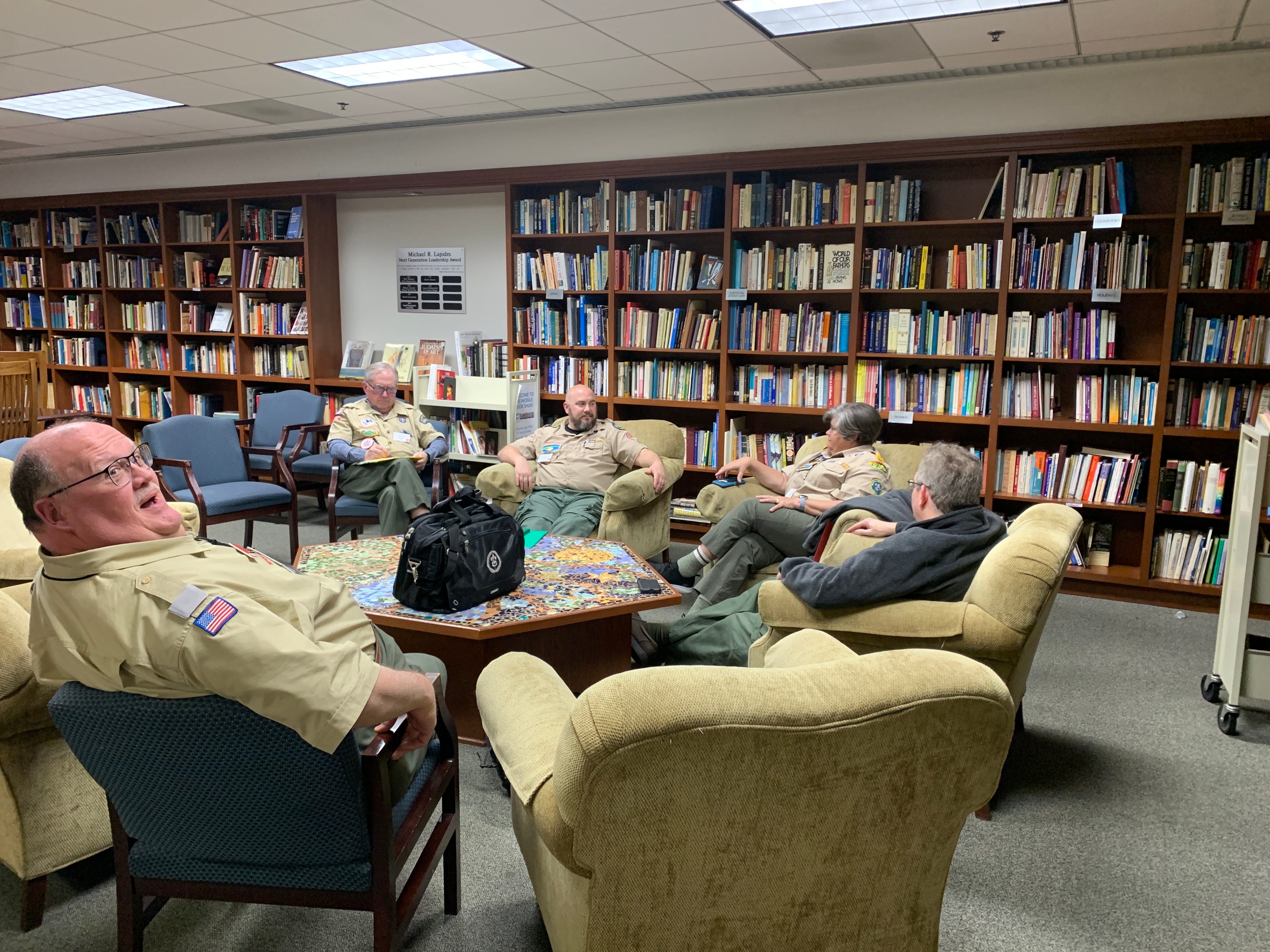
The ones that might have had the most lively discussions were the panel sessions we had. So we had a panel on women in Scouting, scouts of color and LGBTQ+ scouts and allies. Those were mostly a panel of a couple of different folks from that background, sharing their experiences and their perspectives and interacting with the audience and asking for their particular perspectives. And I think that's where we had the most discussions with people saying, "Well, that wasn't my experience in Scouting." But we're having this conversation to remind people that just because it wasn't your experience in Scouting, it doesn't mean that experience is invalid. … But I think it was a really eye-opening conversation for a lot of folks. And I wouldn't say we ever had any aggressive moments or tense moments, per se. It went pretty well.
De Socio: What are some of the changes you might make if you did this again?
Seebauer: I think we'd promote it to a wider audience. When we were first planning on it, we were expecting it to mostly be council-level volunteers. And we ended up getting inadvertently more troop-level volunteers, which I wasn't expecting at all, but they had valuable perspectives. And so maybe going through and actually marketing it for all levels of volunteers would have been a great enhancement.
And I also think it would have been nice if we held it in conjunction with another conference in the future. I'm happy that for the first time, we did it as its own special event. But in the future, I would imagine us possibly combining it with a program conference or a commissioners college or something, and use the same building so we can double up on resources and stuff, but have our own specific track within that other conference.
I recognize that we're somewhat lucky that we have two of the largest councils in the country in D.C. and Baltimore, so we were able to sustain enough people to make this happen. But I can imagine that if you're somewhere else that has smaller councils, it would be hard to get enough people for this specifically. So if you can combine it with another event, so you can pay facility fees together, pay for food orders, etc. We wanted to make this a low barrier of entry for folks to come. So we even offered a discounted rate for younger adults, because we wanted to make sure we got them in the room.
De Socio: And are you planning on making this an annual event?
Seebauer: I think it will be something that we want to integrate into our other conferences that we're already having. Because we want to show that this is a conversation that should be held continuously, every time a group of scouters get together, it's something that we should be thinking about. So whether it's commissioners getting around, or it's program volunteers getting together, this is something that the conversation should be always held, regardless of what the event is.
